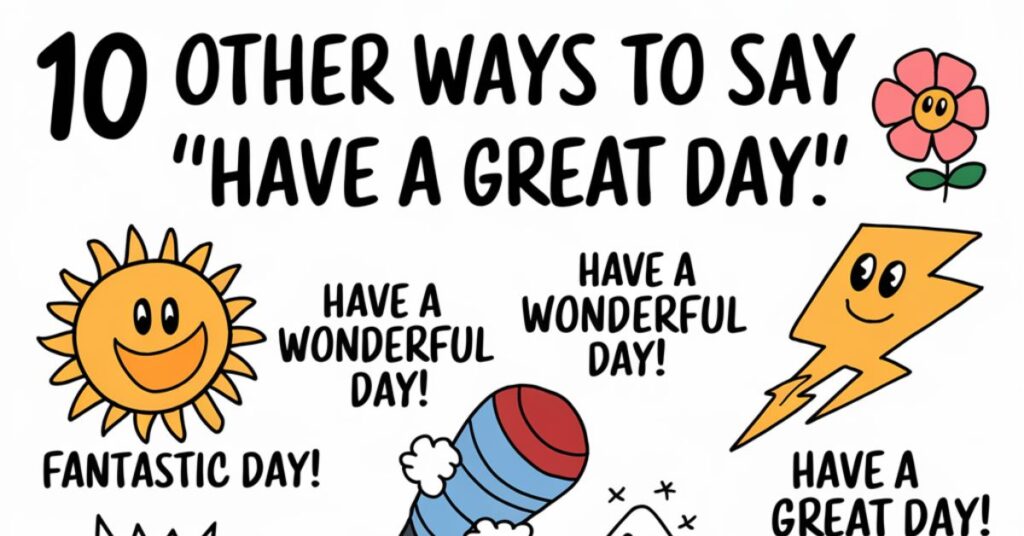In our daily conversations, “Have a great day” is a phrase many of us say without much thought. While it’s a polite and positive expression, it can become overused and lose its original warmth. So why not explore other alternative expressions to make your words more sincere and comprehensive? Whether you’re wishing someone well in personal and professional settings, or sending a note in casual and formal situations, switching up your phrasing can make a more memorable impact.
In this article, we’ll dive into 10 alternative ways to say “Have a great day,” while also exploring how different tones and contexts can influence your choice of words. We’ll also provide motivational and empowering examples that will leave a lasting impression, all while incorporating poetic and heartfelt undertones when appropriate. Let’s elevate our daily greetings!
Why It’s Important to Switch Up Your Greetings
Using the same phrase over and over can become monotonous, not only for you but also for the person you’re speaking to. Positive wishes don’t have to be repetitive, and by tweaking your wording, you can:
- Stand out in conversations
- Convey sincere and comprehensive emotion
- Adjust to the tone and context, whether casual and formal
- Show thoughtfulness and care in your communication
Sometimes, the situation might call for a more enthusiastic and forward-looking message, especially if you’re trying to motivate or uplift someone. In more spiritual or religious settings, you might want to add a touch of goodwill or blessing. Being mindful of the context and adjusting your greeting accordingly can make your message more personal and impactful.
What to Say Instead of “Have A Great Day” (With Examples)
Let’s explore 10 alternative expressions to “Have a great day,” along with situations in which you might use them and how they can suit different contexts.
Enjoy Your Day
Usage: This phrase works well in personal and professional settings. It’s a simple, friendly, and upbeat way to wish someone well.
Example:
“Thanks for your help on the project! Enjoy your day and take some time for yourself.”
Why It Works: “Enjoy your day” is sincere and comprehensive, expressing a wish for someone to have not just a good day, but a fulfilling one. It’s suitable for both casual and formal settings, making it versatile.
ALSO READ THIS ARTICLE:20 Other Ways to Say “Sounds Good” (With Examples)
Make It a Good One
Usage: This phrase has a motivational and empowering tone. It’s ideal for casual conversations with friends or colleagues, especially when someone has a busy or challenging day ahead.
Example:
“You’ve got a lot going on today—make it a good one!”
Why It Works: This phrase conveys optimism and encouragement, offering a sense of support and empowerment.
Wishing You a Wonderful Day
Usage: Ideal for more formal settings, such as emails, professional messages, or letters. It has a more polished, elegant tone compared to the more common “Have a great day.”
Example:
“Wishing you a wonderful day, and I hope your meeting goes smoothly!”
Why It Works: This phrase feels more deliberate and formal, which can be useful in professional settings. The use of “wonderful” gives it a slightly more poetic and heartfelt touch.
Have a Fantastic Day Ahead
Usage: Suitable for both personal and professional settings. This phrase sounds enthusiastic and works well when someone has something exciting on their schedule.
Example:
“Enjoy the trip to the conference! Have a fantastic day ahead.”
Why It Works: It’s forward-looking and energetic, adding enthusiasm to your well wishes.
Take Care and Have a Nice Day
Usage: This phrase combines concern with positivity. It’s often used after someone shares a personal story or after a meaningful interaction.
Example:
“Take care, and have a nice day. I’ll catch up with you later.”
Why It Works: Combining “take care” with “have a nice day” shows both empathy and positivity. It’s sincere and comprehensive, making it perfect for personal and professional settings.
Hope Your Day is Amazing
Usage: This phrase has an enthusiastic and forward-looking tone and is ideal for casual settings or upbeat messages.
Example:
“You’ve been working so hard—hope your day is amazing!”
Why It Works: By using “amazing,” you inject extra energy and excitement into your greeting, making it feel special.
Have a Splendid Day
Usage: If you want to add a touch of class and elegance to your greeting, “splendid” is a fantastic choice. It’s more unique and can stand out, especially in formal settings.
Example:
“Thank you for your support. Have a splendid day ahead.”
Why It Works: The word “splendid” feels a bit more refined and less common, giving your greeting an air of distinction.
Wishing You All the Best Today
Usage: This phrase is ideal for professional or formal settings, particularly when you want to express good intentions.
Example:
“Wishing you all the best today with your presentation.”
Why It Works: It’s a respectful and polished way to convey positive wishes. It can be used in emails, meetings, and even in personal conversations where a more formal tone is required.
May Your Day Be Filled with Joy
Usage: This phrase carries a poetic and heartfelt feel, making it great for personal messages. It also works in contexts where you want to convey a deeper sense of goodwill.
Example:
“May your day be filled with joy and love!”
Why It Works: This is an especially sincere and comprehensive expression, suited for special occasions or meaningful conversations.
Have a Blessed Day
Usage: Common in spiritual or religious settings, this phrase offers well wishes with a focus on blessings and goodwill.
Example:
“Take care, and have a blessed day!”
Why It Works: It has a more profound and spiritual connotation, making it perfect for interactions where faith, goodwill, or deeper connection is important.
How to Choose the Right Phrase for the Right Moment
Choosing the right alternative depends on the situation, the relationship with the person, and the tone you want to set. Below are some factors to consider when deciding how to say “Have a great day”:
Audience Awareness
Who are you speaking to? Consider the formality and familiarity you have with the person. In professional settings, you might want to use a more formal greeting like “Wishing you all the best today.” In contrast, with friends, you can go for a casual “Make it a good one.”
Tone
The tone is key when deciding how to structure your greeting. Do you want to be motivational and empowering, enthusiastic, or calm? For example, if you’re offering someone support, “Take care and have a nice day” is both comforting and warm. On the other hand, for a more upbeat approach, “Hope your day is amazing” is perfect for lifting spirits.
Frequently Asked Questions
When should I use formal alternatives to “Have a great day”?
Formal alternatives like “Wishing you a wonderful day” are best used in professional or email communication, where a more polished tone is required.
What are some casual alternatives to “Have a great day”?
Casual alternatives include “Make it a good one” and “Hope your day is amazing.” These work well in informal conversations with friends or colleagues.
Are there spiritual or religious alternatives?
Yes, phrases like “Have a blessed day” offer a spiritual and heartfelt touch, perfect for faith-based or deeply personal conversations.
Can these phrases be used in emails?
Absolutely! Most of these phrases, especially the more formal ones, are ideal for signing off emails professionally. Try “Wishing you all the best today” for an email-friendly option.
Conclusion
By switching up your greetings, you make your communication more engaging, memorable, and meaningful. Each of the alternative expressions we’ve explored offers something different—whether it’s enthusiastic, poetic, or motivational. Using phrases like “Enjoy your day” or “May your day be filled with joy” can help you express positive wishes that resonate.
Take the time to think about who you’re speaking to and what tone fits best, and don’t be afraid to get creative with your words. These small changes can leave a big impact on both personal and professional settings.

“Robert Henry is an experienced blogger with a passion for language and education. His insightful posts on Vocab Scope offer readers valuable tips on vocabulary and grammar. With a background in linguistics and a knack for clear, engaging writing, Robert is dedicated to helping others enhance their communication skills.”






